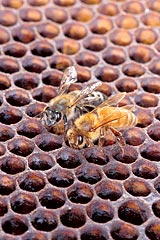Across the United States, European honeybees are vanishing at an alarming rate. Some estimates say we’ve lost at least half the nation’s honeybees in the last 10 years. Almost all the feral (wild) bees are gone, except the occasional swarm that takes up residence in a tree or other nonmanaged location.

The reasons for the die-off are complex and not completely understood. One thing we do know is that unless there’s some change, by 2035 there may be no honeybees left in the U.S. At the very least, we won’t have the European honeybee—the backbone of our American bee culture. We urgently need detailed and extensive research to understand what’s killing the honeybees so we can stop the annihilation.
Believe it or not, the Africanized honeybee, improperly called the “killer bee,” could someday be the salvation of our beekeeping industry. These bees don’t usually attack European bees. But thanks to their mating habits, they do out-compete and replace them: When it comes to mating with a queen, Africanized drones have an advantage over the European drones.
For years, the African bee has been portrayed as a monster to sell newspapers and movie tickets. They do have an aggressive nature, but the most common European honeybee in the U.S. is the Italian variety, which is descended from African bees.
All honeybees can be selected for aggressiveness or gentleness. Even the African bee has become more gentle as it has crossed with European bees during its slow migration northward from South America, where it was imported for experimentation and escaped into the wild. Very few people have died from Africanized bee stings since the breed’s arrival in the U.S. Their venom is no more potent than that of any other bee; they simply attack in greater numbers when the alarm goes out to defend the hive.
Africanized honey bees have been in this country since October 1990, when a swarm entered Texas from Mexico. Since then, they’ve spread throughout the southwestern U.S. and have been in Florida for about two years now. The Africanized bee has shown great resistance to the problems European bees have faced from varroa mites, and some beekeepers in the Southwest have had great results with Africanized bees. In truth, their aggressiveness is more of an annoyance to beekeepers than a real threat to the general public.
If we lost our remaining European honeybees, it appears we might still have the Africanized bee to depend on for honey and crop pollination. The public must be educated about the reality of Africanized honeybees before they reach North Carolina, to prevent needless hysteria and the passage of misguided ordinances that would hamper the important work done by honeybees and beekeepers. If the Africanized bee became the only honeybee left in the U.S., we would quickly realize how fortunate we were to have such an important pollinator.
Beekeepers would adapt to the bees’ aggressiveness while we selected them for gentleness. With concentrated breeding efforts in most apiaries, I believe we could select for gentler bees across the board in less than a generation.
As a beekeeper, I would much prefer to save the gentle European honeybee, but either way, we’re facing a crisis. Before we can solve it, we must first understand it better; every available researcher needs to tackle the problem. In the meantime, everyone needs to be educated about the vital importance of honeybees and the pressing need for honeybee research. After that, we should all urge our political leaders to fund the research needed to protect and promote this valuable insect.
The one thing that no honeybee has shown resistance to is pesticides. Political leaders also need to hold pesticide manufacturers to a higher standard in protecting the complex relationships between plants and animals. And at the individual level, each of us needs to carefully consider the consequences before applying pesticides.
I urge everyone to contact their congressional representatives about the critical need for government support for increased efforts to research the European honeybee crisis, along wih assistance for beekeepers. Encourage your state representatives to fund additional research at N.C. State University and other institutions in North Carolina. And I encourage local leaders to be honeybee- and beekeeper-friendly when considering local ordinances and policies.
Remember: Whether it was an Italian bee or an Africanized hybrid, every third bite you eat was pollinated by a honeybee.
[Calvin Robinson is vice president of the Buncombe County Beekeeping Chapter. His educational Web site is http://pic5.piczo.com/BeekeeperEducation
Rep. Heath Shuler’s local office is at 356 Biltmore Ave. in Asheville (phone: 252-1651; fax: 252-8734).



Before you comment
The comments section is here to provide a platform for civil dialogue on the issues we face together as a local community. Xpress is committed to offering this platform for all voices, but when the tone of the discussion gets nasty or strays off topic, we believe many people choose not to participate. Xpress editors are determined to moderate comments to ensure a constructive interchange is maintained. All comments judged not to be in keeping with the spirit of civil discourse will be removed and repeat violators will be banned. See here for our terms of service. Thank you for being part of this effort to promote respectful discussion.